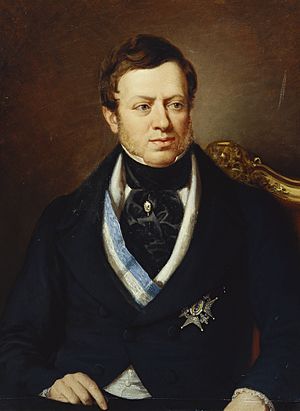José María Queipo de Llano, 7th Count of Toreno facts for kids
Quick facts for kids
The Most Excellent
The Count of Toreno
|
|
|---|---|
 |
|
| Prime Minister of Spain | |
| In office 7 June 1835 – 14 September 1835 |
|
| Monarch | Isabella II |
| Preceded by | Francisco de Paula Martínez de la Rosa |
| Succeeded by | Juan Álvarez Mendizábal |
| Minister of State | |
| In office 7 June – 14 September 1835 |
|
| Prime Minister | (Himself) |
| Preceded by | Francisco de Paula Martínez de la Rosa |
| Succeeded by | Miguel Ricardo de Álava y Esquivel |
| Minister of the Treasury | |
| In office 18 June 1834-13 June 1835 |
|
| Prime Minister | Francisco de Paula Martínez de la Rosa |
| Preceding | José Imaz Baquedano |
| Succeeded by | Juan Álvarez Mendizábal |
| Personal details | |
| Born | 25 November 1786 Oviedo, Spain |
| Died | 16 September 1843 (aged 56) Paris, France |
| Political party | Realista Moderado |
José María Queipo de Llano y Ruiz de Saravia, 7th Count of Toreno (born November 25, 1786 – died September 16, 1843) was an important Spanish politician and historian. He was also known as the Count of Toreno. He even served as the Prime Minister of Spain for a short time.
Contents
Early Life and Education
José María Queipo de Llano was born in Oviedo, Spain, on November 25, 1786. His family was very wealthy and came from old noble families in Asturias. His mother, Dorninga Ruiz de Saravia, owned land in the province of Cuenca.
José María received an excellent education. He studied classics, mathematics, and several modern languages. He learned about the ideas of thinkers like Voltaire and Rousseau.
Start of His Political Journey
In 1808, when he was still young, José María was in Madrid. The city rose up against the French army led by Marshal Murat. This event, on May 2, 1808, marked the beginning of the Peninsular War. José María took part in this fight.
After this, he went to Asturias. On May 30, he sailed to Jersey with other leaders. They wanted to ask England for help against the French. The English government welcomed them warmly in London.
By December 30, he was back in Asturias. His father had passed away while he was gone.
Serving in the Cortes
During the Peninsular War, José María mainly worked as a member of the Cortes. The Cortes was like the Spanish parliament. In 1809, he was in Seville, where his uncle was part of the central government.
The next year, he helped push the government to call a new Cortes. He was elected by Asturias in 1811. He was a few months younger than the legal age of twenty-five. Some of his relatives disagreed with his election. However, the Cortes approved his position.
José María was known for helping to create the Spanish Constitution of 1812. This constitution was very modern and supported liberal and republican ideas.
Exile and Return to Spain
In 1814, King Ferdinand VII returned to Spain from prison in France. The king was very strict and did not like the new constitution. José María knew there would be trouble. He left Spain to avoid the king's anger.
He stayed in exile until 1820, when a new revolution started. This period was called the Trienio Liberal. Between 1820 and 1823, he returned to Spain and served in the Cortes again. During this time, his political views became more moderate.
When the French army intervened in Spain in 1823, José María had to go into exile once more. He remained abroad until King Ferdinand VII announced a general pardon in October 1832.
Later Political Career
José María returned home in July 1833. He stayed on his family's land until the king died on September 29. As the traditional standard-bearer of Asturias, it was his duty to announce the new young queen, Isabella II.
In 1834, his moderate views made him a good choice for the queen regent, Maria Christina. In June 1834, he became the Minister of Finance. Soon after, on June 7, he became the Prime Minister of Spain.
His time as Prime Minister was short, lasting only until September 14 of the same year. The regent tried to keep a very strong government while pretending to be constitutional. This attempt failed.
Historian and Final Years
After his time as Prime Minister, José María spent most of his remaining life in voluntary exile. He passed away in Paris, France, on September 16, 1843.
José María is best remembered for his important book, History of the Rising, War and Revolution of Spain. He started writing it between 1823 and 1832. It was published in Paris between 1836 and 1838. This book was one of the first and most complete studies of the Peninsular War. It was written by a Spaniard who played a big role in those events.
See also
 In Spanish: José María Queipo de Llano para niños
In Spanish: José María Queipo de Llano para niños
 | Chris Smalls |
 | Fred Hampton |
 | Ralph Abernathy |

